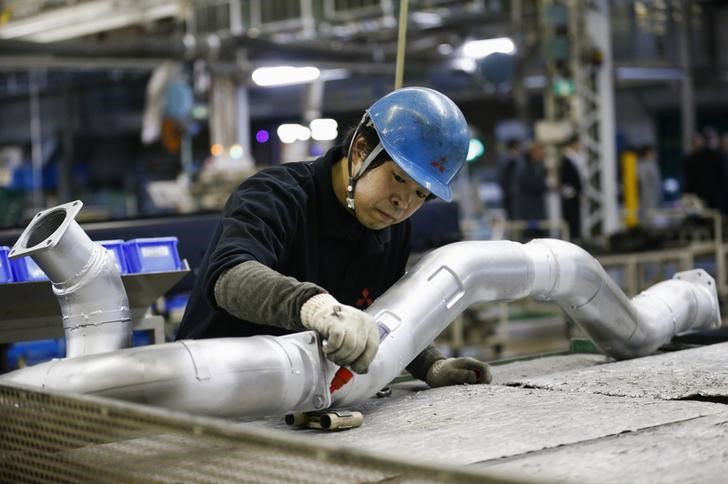By Daniel Leussink
TOKYO (Reuters) - Japan's March factory output fell at the fastest pace in five months, while retail sales also dropped as businesses struggled with the coronavirus pandemic's sharp hit to overseas and domestic demand.
The global economy could this year see the steepest downturn since the Great Depression of the 1930s due to a virus-driven collapse of activity, with Japan's economy facing stagnation due to its export dependence and soft domestic consumption.
Official data on Thursday showed factory output slipped 3.7% in March from the previous month, a smaller decline than the 5.2% drop in a Reuters forecast.
The reading marked the sharpest fall in production since October last year, and followed a downwardly revised 0.3% drop in the previous month.
Automakers and machinery manufacturers suffered output declines due to slower demand for parts and equipment from factories overseas, especially in China.
Manufacturers surveyed by the government expect output to rise 1.4% in April and drop 1.4% in May, the data showed.
Separate data showed retail sales tumbled at their fastest pace since last October's sales tax hike as the outbreak forced department stores to shut their doors and consumers to cut spending.
Retail sales slumped 4.6% in March from a year earlier, pulled down by tumbling demand for general merchandise and clothing as well as plunging department store sales.
Japan was already struggling with weak demand before the outbreak after the government raised the sales tax to fix its heavy public debt burden, which is more than twice the size of the gross domestic product.
The economy shrank an annualised 7.1% in the three months through December due to the hit from the U.S.-China trade war and the sales tax hike.
The soft batch of data comes after the government boosted its spending package to a record $1.1 trillion to expand cash payouts to every citizen to offset the widening economic hit.
That move was followed this week by expanded stimulus from the Bank of Japan, which rolled out fresh steps to ease corporate funding strains and pledged to buy unlimited amounts of bonds to keep borrowing costs low.
Official data on Tuesday showed the widening hit to the jobs market from the outbreak. The March jobless rate rose to its highest in a year, while job availability slipped to a more than three-year low.
